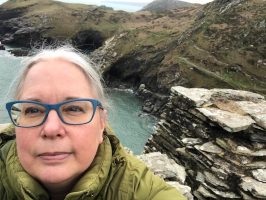Toby’s Story
 My name is Tobi Sellekaerts and I’m an American living overseas in the U.K. I am very happy to be completing my M.S. in Spatial Informatics at the University of Maine, via the online degree offering. Reasons why I chose Maine’s online program over several other programs include:
My name is Tobi Sellekaerts and I’m an American living overseas in the U.K. I am very happy to be completing my M.S. in Spatial Informatics at the University of Maine, via the online degree offering. Reasons why I chose Maine’s online program over several other programs include:
- The faculty and staff are all on-site and employed by the University of Maine. All classes are taught by University of Maine faculty, and not contracted out to external instructors (for example, the program at Johns Hopkins only uses contracted instructors). All classes are taught by professors, with Teaching Assistants available for help where needed.
- The online offering is an online version of the same programs offered in person at Orono; there are undergraduate and Ph.D. students in the same department. It’s not just a degree mill for online Masters degrees or certificates. There is a ‘brick-and-mortar university behind the instruction and degree, where I could go to meet my instructors if I wanted to (and I have! I stopped by last summer to meet my advisor).
- The price is phenomenal: the online degree costs the same as in-state tuition. Even in my case where my company is reimbursing me for the costs, I come in well under the annual cap thanks to the price. (The program at Maine will come in at less than $20k; the other two programs I considered were each closer to $50k.)
- Maine’s Spatial Data Science Institute (the successor to the National Center for Geographic Information and Analysis (NCGIA)) was another big draw, as it is one of only three Universities in the country to have been part of the NCGIA.
In addition, there are in-person students, virtual students, and asynchronous students for most classes I’ve taken. I think the multiple-format offerings mean the class sizes are small, so the instructors can balance out the in-person and online experiences. These different formats for the same class also mean I can attend live when my schedule allows it, and watch the recorded lectures when my schedule does not. Being in Europe, and working full-time, the time difference between here and Maine benefits me – afternoon classes in Maine occur in my evenings.
I have 30 years of experience working in the field, but most of it has been hands-on with industry software. In that time my thinking has narrowed to ‘What can the software do?’ and away from ‘What should be done?’. I was desperate to reestablish theoretical foundations and expand my academic horizons, and this degree has allowed me to do that. I’ve also been able to capitalize on these fresh approaches to the material to make immediate improvements at my job. The material has definitely been challenging, but I have learned so much! The instructors are all knowledgeable and passionate about their subject areas.
I hear horror stories from other university students about the cost of required textbooks for each semester’s courses. For all 10 courses required for this degree, I only had to purchase one full-priced book – for the rest, I’ve either been able to purchase used books, or all the learning materials have been provided digitally by the instructors. We use open-source software or software already licensed by the University. I have had very few out-of-pocket costs other than the standard tuition and fees for my program.
Finally, the degree has been worth more than the sum of its parts. I feel the required coursework for the degree has been painstakingly considered and selected by the department faculty, which can only be done when the faculty communicates regularly (which works best when all the instructors are actually employed at the University and are co-located). The classes complement each other, reinforcing concepts across the program. This cohesion reflects the high quality of the department.
– Toby Sellekaerts

